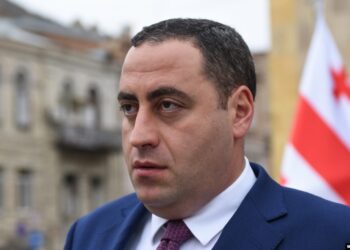Senior figures from Georgia’s ruling Georgian Dream party, including President Mikheil Kavelashvili, have strongly condemned the assassination of American far-right commentator Charlie Kirk, framing the attack as part of a wider critique of left-wing politics.
Kirk, 31, was fatally shot in the neck by what appeared to be a sniper while speaking at a Utah college campus on Wednesday. He was pronounced dead shortly afterward. The killing is being described internationally as one of the most significant acts of political violence in the United States in recent years.
Expressions of shock and condemnation poured in across the US and abroad. Georgian leaders also issued statements of condolence, many of them seizing the moment to reiterate longstanding criticisms of liberal and leftist politics both domestically and internationally.
Prime Minister Irakli Kobakhidze initially reacted in measured terms but later echoed harsher criticism, claiming the assassination illustrated “where these so-called liberals and pseudo-liberals are dragging the modern world.” He further alleged that “certain activists” linked to the opposition United National Movement (UNM) party, as well as “foreign-funded individuals,” responded to the murder with “laughter and ridicule,” according to pro-government outlet TV Imedi.
Imedi also ran a follow-up piece sharply criticizing opposition reactions to Kirk’s death.
Meanwhile, the shooter remains unidentified and at large. In the absence of concrete information, conspiracy theories have flourished online. Former Russian President Dmitry Medvedev claimed, without evidence, that Ukraine was behind the attack—a narrative amplified by pro-Kremlin propagandist Chay Bowes.
Kirk, a prominent ally of US President Donald Trump and a central figure in the conservative activist group Turning Point USA, was a highly influential voice on the American right. He was known for his campus tours, where he frequently engaged in combative debates, and for making a series of inflammatory and divisive remarks. Critics at times described him as a white nationalist, though his influence within Republican and conservative circles remained significant until his death.














